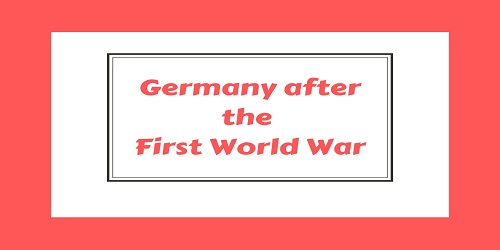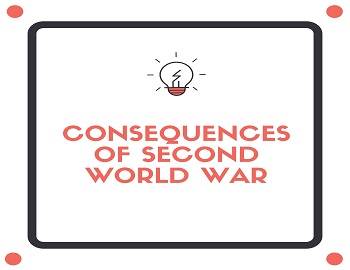Germany after the First World War:
Germany’s defeat in the First World War brought about the downfall of the Hohenzollern Empire. Germany became a Republic- generally called the Weimar Republic and Ebert- a prominent Socialist, became its President. The Weimar constitution of the new German Republic was thoroughly democratic. While it retained the federal organization it lessened the powers of the several states and strengthened those of the Central Government. The executive authority was vested in a President, elected by the people for seven years, and in a Chancellor and ministry responsible to the Reichstag. The constitution included a detailed bill of rights, provisions of a proportional representation of all parties, and for a National Economic Council.
The Weimar Republic had to encounter serious difficulties. In 1919 a communist uprising occurred in Berlin and hundreds were killed. The next year monarchist rebels attacked the government. For various reasons, the Weimar Republic did not endure long. Germany was burdened with an enormous amount of reparation for damages to the victorious allies. There was inflation which reached a climax in 1923 when a basketful of notes would not buy a dozen eggs. To economic distress was added the tyranny of injustice. The French occupation of the Ruhr caused Germany deep humiliation. In 1924 the first attempt was made to reduce the burden of Germany’s war debt under the Dawes Plan. The operation of this plan was achieved in 1929 by the Young Plan under which Germany was required to complete payment of her debt within the next six decades.
In 1925 President Ebert died and Field Marshal von Hindenburg was elected President of the Republic. During the years 1923-29 German foreign policy was controlled by Gustav Stresemann. In the words of Lord D’Abernon, he, “raised Germany from the position of a stricken and disarmed foe into that of a diplomatic equal.” To D’Abernon, Gustav Stresemann seemed like a German Winston Churchill. “Probably he remained an intense, even a romantic nationalist, but he saw that German nationalism might be better served by subtle diplomacy than by showing one’s teeth.” Under his leadership, Germany signed the Treaty of Locarno in 1925 which reduced tension between France and Germany. This improved the international position of Germany. She was admitted as a member of the League of Nations in 1926. Truly, the conclusion of the Treaty of Locarno and German entry into the League of Nations were the most important achievements of the foreign policy of Stresemann. The most remarkable thing was that though he tried to win over the cooperation of the Allied Powers, he maintained the friendship of Germany with Russia whom the Allied Powers detested from the core of their heart.
The difficulties of Germany had not come to an end when the World Depression started in 1929. It deeply affected Germany. Several of her industries closed down, throwing millions of workers out of employment. Now it became impossible for her to pay the installments of war damages. America also refused to advance her loans and this made the condition of Germany all the worse. The rise of Hitler and the Nazi revolution took place against this historical background.









Comments (No)